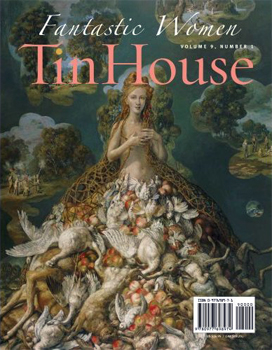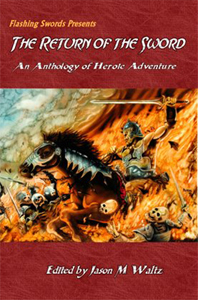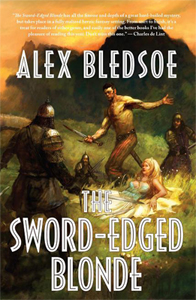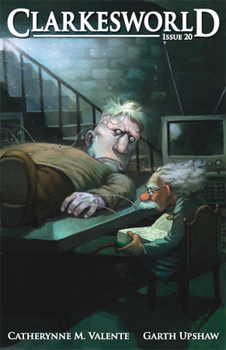When I first wrote about the New Edge back in an editorial for the Flashing Swords e-zine, there were a number of bloggers who LOUDLY misinterpreted what the crafters of the manifesto and I were after. One proclaimed that we must not be in touch with modern fiction; after all, writer A had just written a novel with some sword-and-sorcery in it a few years back, so, see, the genre was alive and well!
Anyone who’s been trying to get sword-and-sorcery published knows better. First, there’s really not much sword-and-sorcery in long form. Write me with examples if you want, but those examples are the exception, not the rule. And short fiction markets, well, those have been unwelcoming and hostile to sword-and-sorcery for a very, very long time. Ask anyone who’s been trying to get it published. I’m not talking about the bad stuff, either; I’m talking about talented authors. Take James Enge, whose Morlock stories were routinely bounced before John O’Neill pulled him out of Black Gate’s submission pile. Those of us who write sword-and-sorcery have been duking it out in the trenches, fighting for a place in the small press and dreaming that the larger magazines that claimed to accept sword-and-sorcery on their guidelines pages really would.
Sword-and-sorcery has been down and out for so long that it has often survived in a bastardized form by parodying itself. Writers who claim to craft it have had to do so with sly winks and nods, looking the while straight into the camera to let the audience know it’s all just a giggle. The parodies, the mocking irony, the humorous send-ups; they have all the charm and finesse of a man who chuckles as he sneaks up to kick a sleeping dog.
To be new, to be fresh, we must throw off the shackles of those who have tried to remold the genre to be respectable, and we must step past those who hoped to de-fang it to apologize for the genre’s faults and bad practitioners. That is not to advocate being humorless. Fritz Leiber and Clark Ashton Smith and Jack Vance and Roger Zelazny (and others) all employ both humor and irony in their works. And lest we forget, no matter the stereotype, Robert E. Howard’s Conan could crack a smile. These writers, though, wove the humor, the irony, through their work. The story was still paramount. They were trying to please the same sort of audience who gathered at the foot of ancient storytellers, not the young critic who lurked on the edges of the campfire, sneering at the conceits of the story, or the notion that anyone would really want to hear about heroes and brave deeds.
It might be that those critics were sneering for a reason, of course; it might be that they wanted to spread their wings and try new things and were angry that they had no forum that would take them. Once upon a time, they were the minority. They were the rebels yearning to break old forms. Once upon a time, when the short fiction magazines offered nothing but adventure fiction, I might have joined them, or at least experimented a little bit along with them. Maybe you would have tried it too.
Those rebels overthrew the evil empire, drove out its adherents, and assumed the throne. But the rebellious work that daringly flew in the face of all the sword-slinging, raygun-blasting adventure fiction has transformed into the kind of intractable behemoth it fought so hard to overcome. Now, all too often, it is only those flavors that we find in short fiction markets. It might be that this change in featured fiction has something to do with declining magazine readership, but there are so many other factors involved in declining readership that this point would be difficult to prove. No matter: you will never convince me that the shift in publishing preferences and decline in readership are unrelated.
For quite some time now, poets and artists and musicians and writers have been struggling against the crushing judgment that art that resembles things, poetry that scans and rhymes and tells stories, music that’s actually melodic, and stories about heroism are unrefined, staid, and unworthy of notice. Despite the weight of all prior human artistic achievement, despite basic common sense, we’ve sheepishly bowed our heads and gone along with it.
Maybe a lot of human behavior is petty and small. Maybe a lot of people and events leave us bemused and saddened and feeling powerless. But even if that’s true it doesn’t mean that we need to drown in tales of powerless people emoting their woes, or that it is good for us to subsist only upon that fiction (or that we are childish if we don’t find satisfaction reading it!). No; if those things are true then we have all the more reason to need stories of heroes — stories of men and women who stood up when the odds and the gods and even their dearest friends and family seemed against them and did the right thing anyway.
We’ve been conditioned to believe that there aren’t any real heroes and that everyone’s in it for themselves; we’ve been trained to be skeptical and ironic and detached and sarcastic and hip. Yet even as we sneer and laugh with our friends, we know it’s a lie. Heroes really are out there. They’ve lived and breathed and sacrificed right here on this very Earth, and some of them are still at it. Students of history know them. Sometimes we can even find them covered by our local news stations. Stories of heroes, not of dejected mopers, have inspired us since the dawn of humanity, and we should not be embarrassed if they continue to fire our imagination.
I do not say that turnabout is fair play; I do not advocate overthrowing the current mindset with an older one. But I do say that all short fiction has a place. Sword-and-sorcery and other tales of high adventure should no longer be cast out from the camp fire, or given only grudging room there, like a crazy uncle with fleas. We have not outgrown these stories, no matter what some would have you think. You know in your hearts we need them still.
Coming Soon: Part 3
Howard

 I may be addressing a small number of folk here, but I wanted to call attention to a few folks who I think deserve some credit. So… if you happen to have attended the 2006 or 2007 World Fantasy Convention and are in the mood to vote for such categories as Life Achievement, I hope you’ll lend me your ears.
I may be addressing a small number of folk here, but I wanted to call attention to a few folks who I think deserve some credit. So… if you happen to have attended the 2006 or 2007 World Fantasy Convention and are in the mood to vote for such categories as Life Achievement, I hope you’ll lend me your ears.

 This week we lower the drawbridge at Black Gate headquarters and invite you to head out to Clarkesworld magazine for your weekly genre fix. Clarkesworld has just published a lengthy article on the profound effect that fantasy gaming has had on fantasy writing. Written by Justin Howe and Jason S. Ridler, the piece is titled “Of Dice and Men: Modern Fantasists and the Influence of Role-Playing Games.”
This week we lower the drawbridge at Black Gate headquarters and invite you to head out to Clarkesworld magazine for your weekly genre fix. Clarkesworld has just published a lengthy article on the profound effect that fantasy gaming has had on fantasy writing. Written by Justin Howe and Jason S. Ridler, the piece is titled “Of Dice and Men: Modern Fantasists and the Influence of Role-Playing Games.”